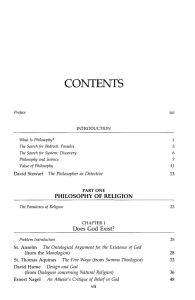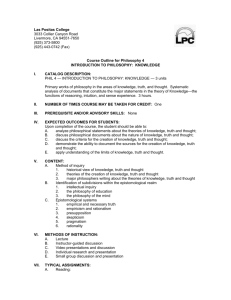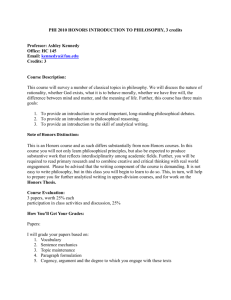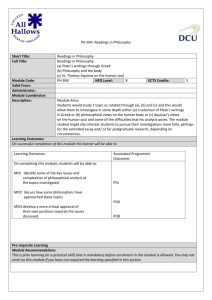August - TILT - Colorado State University
advertisement
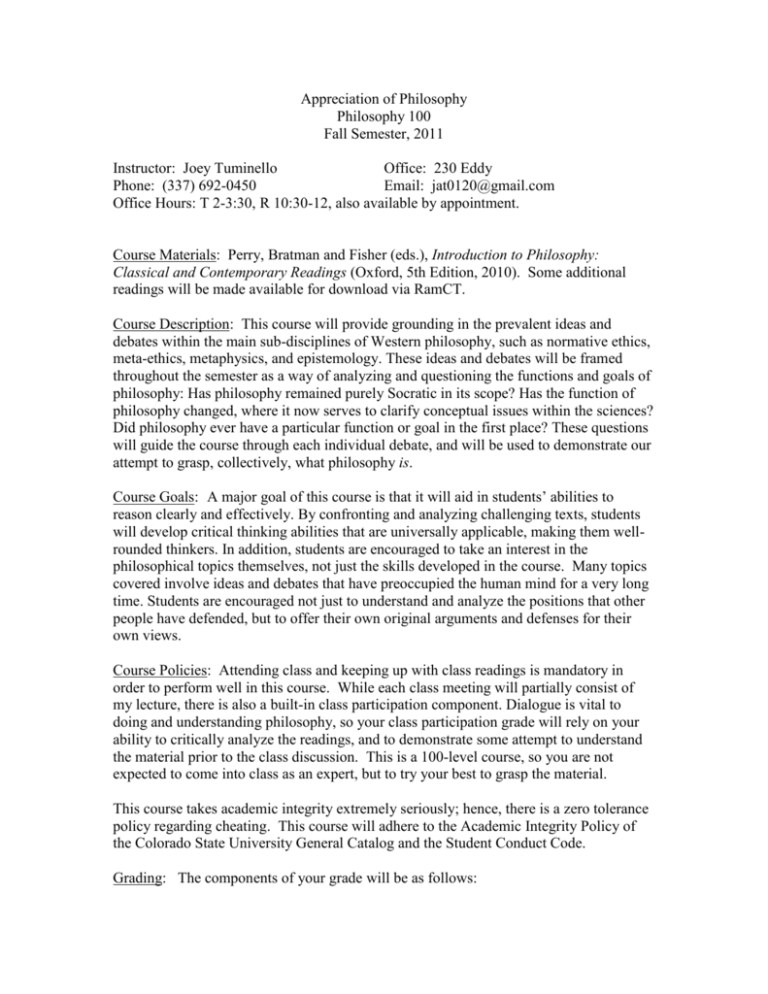
Appreciation of Philosophy Philosophy 100 Fall Semester, 2011 Instructor: Joey Tuminello Office: 230 Eddy Phone: (337) 692-0450 Email: jat0120@gmail.com Office Hours: T 2-3:30, R 10:30-12, also available by appointment. Course Materials: Perry, Bratman and Fisher (eds.), Introduction to Philosophy: Classical and Contemporary Readings (Oxford, 5th Edition, 2010). Some additional readings will be made available for download via RamCT. Course Description: This course will provide grounding in the prevalent ideas and debates within the main sub-disciplines of Western philosophy, such as normative ethics, meta-ethics, metaphysics, and epistemology. These ideas and debates will be framed throughout the semester as a way of analyzing and questioning the functions and goals of philosophy: Has philosophy remained purely Socratic in its scope? Has the function of philosophy changed, where it now serves to clarify conceptual issues within the sciences? Did philosophy ever have a particular function or goal in the first place? These questions will guide the course through each individual debate, and will be used to demonstrate our attempt to grasp, collectively, what philosophy is. Course Goals: A major goal of this course is that it will aid in students’ abilities to reason clearly and effectively. By confronting and analyzing challenging texts, students will develop critical thinking abilities that are universally applicable, making them wellrounded thinkers. In addition, students are encouraged to take an interest in the philosophical topics themselves, not just the skills developed in the course. Many topics covered involve ideas and debates that have preoccupied the human mind for a very long time. Students are encouraged not just to understand and analyze the positions that other people have defended, but to offer their own original arguments and defenses for their own views. Course Policies: Attending class and keeping up with class readings is mandatory in order to perform well in this course. While each class meeting will partially consist of my lecture, there is also a built-in class participation component. Dialogue is vital to doing and understanding philosophy, so your class participation grade will rely on your ability to critically analyze the readings, and to demonstrate some attempt to understand the material prior to the class discussion. This is a 100-level course, so you are not expected to come into class as an expert, but to try your best to grasp the material. This course takes academic integrity extremely seriously; hence, there is a zero tolerance policy regarding cheating. This course will adhere to the Academic Integrity Policy of the Colorado State University General Catalog and the Student Conduct Code. Grading: The components of your grade will be as follows: a) Three in-class examinations (including final exam). These will consist of multiple choice and short-answer questions. Each exam will be focused on new material not encountered in the previous exam, although a small amount of questions may be cumulative. Each exam will count for 20% of your grade. b) One “staged” writing assignment. This will simply involve the careful reconstruction in your own words of an argument from our readings, followed by a critical discussion. The paper will have a 1000-word maximum. Your original paper will count for 10% of your grade. After grading, papers will be returned with extensive comments and suggestions. By the last day of class, papers must be revised based on comments and suggestions, and turned in again. Your revised paper will count for 20% of your grade. Topics will be provided well in advance of the original assignment’s due date. c) Attendance and participation. Attendance sheets will be passed around each class period. Participation will be evaluated at the end of the semester, based on each student’s quantity and quality of in-class discussion. Attendance and participation will count for 10% of your grade. Schedule of Readings: Because of the difficulty of many of these readings, it is important to do the reading both before and after class, in order to gain a better understanding of the key points of debate and discussion. The reading schedule is subject to change, so please be sure to keep up with class meetings in case changes occur. August September 22 Introduction 24 Plato, Euthyphro (available via RamCT) 26 Plato, Apology: Defense of Socrates 29 Descartes, Meditation I (pp. 136-138) 31 Gettier, “Is Justified True Belief Knowledge?” 2 Nozick, “Excerpt from Philosophical Explanations” 5 Labor Day; no class 7 Hume, An Enquiry Concerning Human Understanding, pp. 190199 9 Hume, An Enquiry Concerning Human Understanding, pp. 199213 12 Descartes, Meditation II (pp. 138-141) PAPER #1 DUE October 14 Ryle, “Descartes’ Myth” 16 Armstrong, “The Nature of Mind” 19 Nagel, “What Is It Like to Be a Bat?” 21 Jackson, “What Mary Didn’t Know” and Lewis, “Knowing What It’s Like” 23 Dennett, “Where Am I? 26 Catch-up Day; no new reading 28 TEST NUMBER ONE 30 No class; instructor will be out of town 3 Hume, “Of Liberty and Necessity” 5 Chisholm, “Human Freedom and the Self” 7 Frankfurt, “Alternate Possibilities and Moral Responsibility” 10 Frankfurt, “Freedom of the Will and the Concept of a Person” 12 Nagel, “Moral Luck” – ORIGINAL PAPER DUE DATE 14 Anselm, “The Ontological Argument” 17 Aquinas, “The Existence of God” 19 Hume, Dialogues Concerning Natural Religion, pp. 60-71 21 Hume, Dialogues Concerning Natural Religion, pp. 71-84 PAPER #2 DUE 24 Hume, Dialogues Concerning Natural Religion, pp. 84-93 26 Perry, “Dialogue on Good, Evil and the Existence of God,” pp. 96108 28 Perry, “Dialogue on Good, Evil and the Existence of God,” pp. 108-119 31 Pascal, “The Wager” November 2 Clifford, “The Ethics of Belief” (available via RamCT) 4 James, “The Will to Believe” (available via RamCT) 7 Catch-up Day; no new reading 9 TEST NUMBER TWO 11 Mackie, “The Subjectivity of Values” 14 Harman, “Ethics and Observation” 16 Sturgeon, “Moral Explanations” 18 Mill, “Utilitarianism,” pp. 460-469 21-25 Fall Break December 28 Mill, “Utilitarianism,” pp. 469-476 30 Singer, “Famine, Affluence and Morality” 2 Velleman, “A Brief Introduction to Kantian Ethics” 5 Nagel, “War and Massacre” 7 Wolf, “Moral Saints” 9 Wolf, “The Meanings of Lives” 14 FINAL EXAM from 9:40 to 11:40 p.m.



